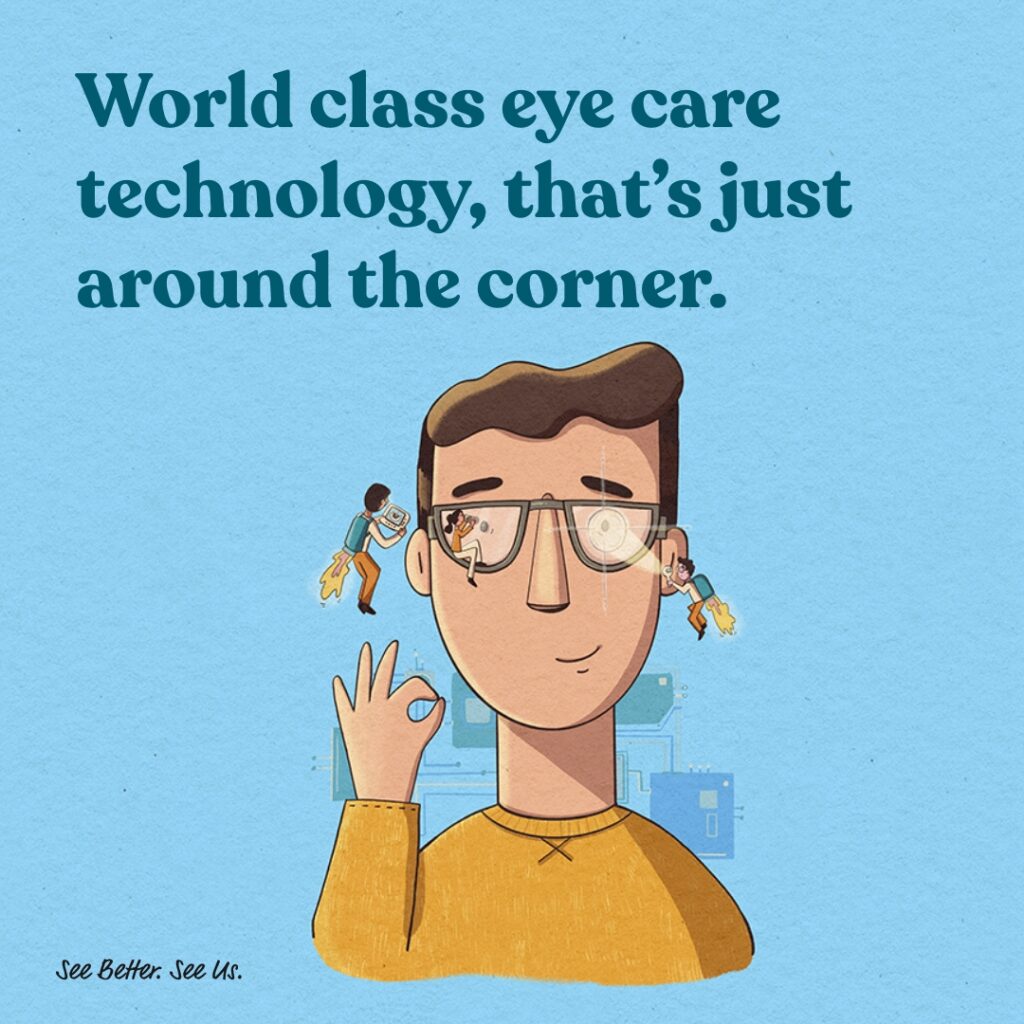World Class Technology In-Store

At Beckenham Optometrists, our technology can spot vision changes before they become a problem. When you book an eye exam with our team you get access to world class eye care technology including retinal imaging, OCT scanning, visual field testing, and DNEye scanning. Some of these machines are diagnostic, in that they assist in the early detection of eye conditions, while others are used to ensure your glasses are perfectly catered to your eyes’ needs. Let’s learn more about each machine!
DNEye Scanner
Our DNEye scanner is revolutionary eyesight test technology from Rodenstock in Germany that takes measurements of your eyes. This machine is unique, as it takes more than 7,000 measurement points; and these biometric values are integrated into your individual lenses.
These DNEye optimised lenses provide you with the following benefits:
- High sharp contrast vision
- Optimum night vision, for safe sight
- Largest field of vision, to experience natural vision
- Colourful, natural vision experiences.
With high-precision 3D eye measurements from the DNEye scanner, we measure your eyes more precisely than ever before, so you can receive the most individualised lenses perfect for your eyes. Luckily this technology is available to you if you require single vision or progressive lenses!
OCT Scanner
Here at Beckenham Optometrists we also have an OCT machine, a piece of diagnostic equipment which stands for Optical Coherence Tomography. It’s a non-invasive imaging test, which uses light waves to take cross-sections of your retina. It produces both retinal photographs and 3D images of the back of your eye.
The OCT is a useful piece of technology to test the health of your eyes and reveal any abnormalities. It does so by imaging the retina’s distinctive layers, so the optometrist can map and measure their thickness, enabling them to recognise the signs of visual abnormalities which may later develop into disease and to monitor the progression of diseases. This is important as most eye diseases don’t present with symptoms until they’re advanced.
The OCT is useful in diagnosing the below conditions, as well as others:
- Age-related macular degeneration
- Diabetic eye disease (DR)
- Disorders of the optic nerve
- Glaucoma
- Macular Oedema
Visual Field Testing
Your visual field is how wide your eye can see when focussing on a central point, including your peripheral vision. In other words, it’s the entire area in which you see. The visual field machine which we have in store at Beckenham Optometrists is used to measure how well you can see throughout visual space. The machine uses a variety of tests that utilise a large number of locations across your eyes surface to ascertain an accurate map of your vision.
This piece of diagnostic equipment is therefore used to test how much vision a patient has in each eye, how sensitive vision is in different parts of the visual field, and to monitor vision loss over time. Importantly, visual field testing is a crucial part of the diagnosis and treatment of all glaucomas and many neurological diseases. In the case of glaucoma, visual field testing is required to see if a person’s peripheral vision is becoming affected as a result of the disease.
As such patients who are at risk of developing, or are currently diagnosed with glaucoma or any central nervous system problems – including stroke and muscular sclerosis – may require more regular eye exams which involve visual field testing, to monitor their sight and help prevent vision loss.
Retinal Imaging
Retinal imaging is a non-invasive diagnostic tool used to take high-definition, coloured photos of the fundus. The fundus is the inside back surface of your eye, made up of the retina, optic nerve, fovea and blood vessels. This machine is vital for the early detection of diseases. Not only does your optometrist look at current images, but if you’ve had photos taken in the past she can use these to monitor and track small changes over time.
The conditions that can be detected by retinal imaging are:
- Age-related macular degeneration
- Diabetic eye disease (DR)
- Glaucoma
- Retinal vascular changes and detachment
Fundus photography is an integral part of our examination process but should occur more regularly for patients who have a family history of the above conditions or have diabetes.
To make use of our world class technology, book an eye test with us today. Be comfortable in the knowledge we are the best eye care experts for you!







